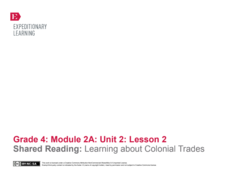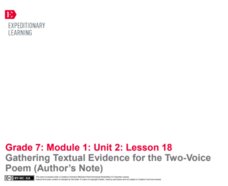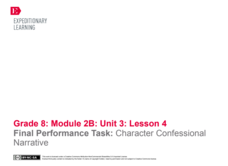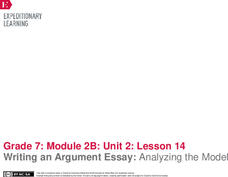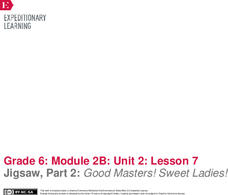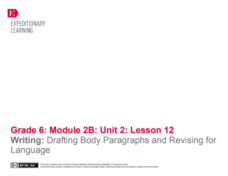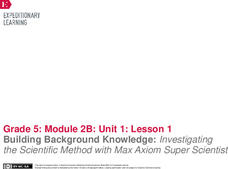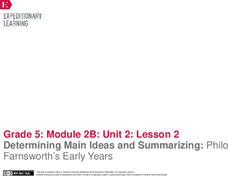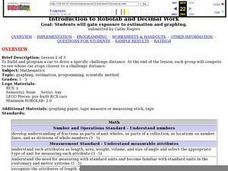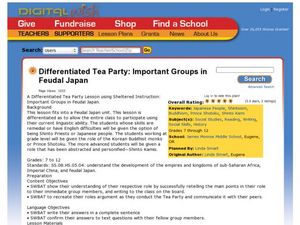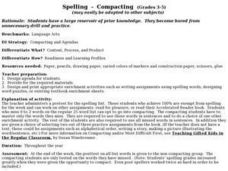EngageNY
Shared Reading: Learning About Colonial Trades
Trading in Colonial America is the focus of a lesson plan that boosts reading skills. As a class, scholars examine the informational text for crucial details, use their newfound knowledge to share information with their peers, and write...
EngageNY
Analyzing the Significance of the Novel’s Title: Connecting the Universal Refugee Experience to Inside Out and Back Again, Part 3
What does it mean to mourn something? Scholars continue reading paragraph four from "Refugee and Immigrant Children: A Comparison" to better understand the mourning process for refugee children. Working with a partner, pupils then read...
EngageNY
Taking a Stand: Equal Rights for Women
Equality for all? Scholars talk with partners to predict Shirley Chisholm's stand in her speech "Equal Rights for Women." They then read the speech and circle unfamiliar words to understand the meaning better. Readers go on to answer...
EngageNY
Text to Film Comparison: Bottom the Fool
Pretty ugly, jumbo shrimp. Oxymorons are awfully good! Scholars reread Act I, scene 2 from Shakespeare's A Midsummer Night's Dream while participating in a drama circle. Next, they begin working on anchor charts to dissect Shakespeare's...
EngageNY
Adding to Cascading Consequences and Stakeholders: Industrial Food Chain
Young researchers create a class Cascading Consequences chart to see how the industrial food chain affects people, animals, and the environment. They also work in teams to complete a Stakeholders chart for the industrial food chain model...
EngageNY
Creating a Visual Component for the Speech: End of Unit Assessment Preparation and Practice
Eye contact, volume, pronunciation. Working with partners, scholars practice presenting their speeches about the best food chain. Additionally, they choose a visual component to support their end-of-unit speech.
EngageNY
Mid-Unit 2 Assessment: Comparing Fictional and Historical Texts
Class members pair up to discuss how the author of A Long Walk to Water altered history. They then work independently on Mid-Unit 2 Assessment: Comparing Water for Sudan and A Long Walk to Water. Readers close the lesson plan...
EngageNY
Gathering Textual Evidence for the Two-Voice Poem (Author’s Note)
Writers take a look at how to gather evidence from the information text in the unit that connects to Salva and Nya’s story. They complete a Gathering Evidence from Informational Texts sheet to guide their work. Pupils then use the...
EngageNY
Final Performance Task: Character Confessional Narrative
You wrote it, now what? Learners take their writing to the next level when they perform it for classmates. They then engage in a self-reflection and assessment of their work to determine how well they hit targets, such as identifying...
EngageNY
Writing an Argument Essay: Analyzing the Model
Class members analyze the model essay to determine the given claim and the evidence to support it. They use an Analyzing Evidence in the Model Essay sheet to help guide their work. They then begin to analyze the structure of the essay by...
EngageNY
Writing an Analysis Essay: Introducing the Writing Prompt and the Model Essay
A model analysis essay provides writers with an opportunity to examine a response to the end-of-unit assessment writing prompt. Scholars define key words in the prompt and discuss how the model essay meets the demands in the prompt....
EngageNY
Selecting Evidence and Partner Writing: Aligning “The Hero’s Journey” and The Lightning Thief (Chapter 5)
Around and around we go! Scholars work in groups to connect The Hero's Journey and The Lightning Thief with a Carousel of Quotes activity. They then independently reflect on the two texts and answer questions about how they...
EngageNY
Jigsaw, Part 2: Good Masters! Sweet Ladies!
Three heads are better than one. Scholars gather back in their triads for another read of their monologues. They answer text-dependent questions and review their work. Learners then present their jigsaw monologues to the rest of the...
EngageNY
Writing: Drafting Body Paragraphs and Revising for Language
This is a formal affair. Scholars take a look at using formal writing in essays. They analyze the model essay Are We Medieval?: Opportunities in the Middle Ages and Today? They then begin working on the first draft of their own...
EngageNY
Building Background Knowledge: Investigating the Scientific Method with Max Axiom Super Scientist
Let's have a look at something different. Scholars take a look at the text Investigating the Scientific Method with Max Axiom Super Scientist and discuss how the structure, graphics, and images appear different than previous works...
EngageNY
Determining Main Ideas and Summarizing: Philo Farnsworth’s Early Years
Teamwork makes the dream work! Learners work in groups to analyze pages 2-9 of The Boy Who Invented TV, The Story of Philo Farnsworth. They complete a first read to determine the gist and a second read to identify main idea and...
Curated OER
Go The Distance Car Construction
Students build and program a car to drive a specific challenge distance.They must at the end of the lesson plan, have the car that stops the closest to a challenge distance.
Education World
Use Boolean Search Terms to Shorten Web Searches
Have you ever conducted a Web search and received too many hits? Teach your class about Boolean search terms and provide them time to practice conducting efficient online searches. This lesson plan contains several fun activities which...
Curated OER
Side-By-Side Division Algorithms
Show classes how to work their way through the algorithms. The long division lesson plan shows five algorithms in dividing multi-digit numbers by a single digit. The algorithms include partial quotients, stacking method, place value long...
EngageNY
More Problems on Area and Circumference
Perimeter check! Pairs work on finding the areas of semicircles and quarter circles using a relationship with squares. The problems challenge pupils to find areas of composite figures made from rectangles, semicircles, and quarter circles.
Curated OER
Differentiated Tea Party: Important Groups in Feudal Japan
Students research the different groups in Feudal Japan. In this Japanese people instructional activity, students are broken into different groups representing the different roles in Japan. They research their group and have a "tea party"...
Curated OER
Quality Work Used to Make a Star Quilt and Its Tradition
Students discover how to design and create a star quilt with the use of the following resources: the community, art, technology, and the teacher. They examine how to apply the skill of doing quality work to other areas of their life.
Curated OER
Spelling - Compacting (Grades 3-5)
Learners use compacting when learning spelling words. In this spelling lesson, students take a pre-test on their weekly spelling words. Learners who score 100% are exempt from spelling and those who miss 0-2 words compact their studying...
Curated OER
Pendulum Lab in 9th Grade Physical Science
Ninth graders conduct experiments to determine what affects the rate of a pendulum's swing. Working in small groups, they identify an independent variable to study and create an experiment to test their hypothesis. When tests are...


